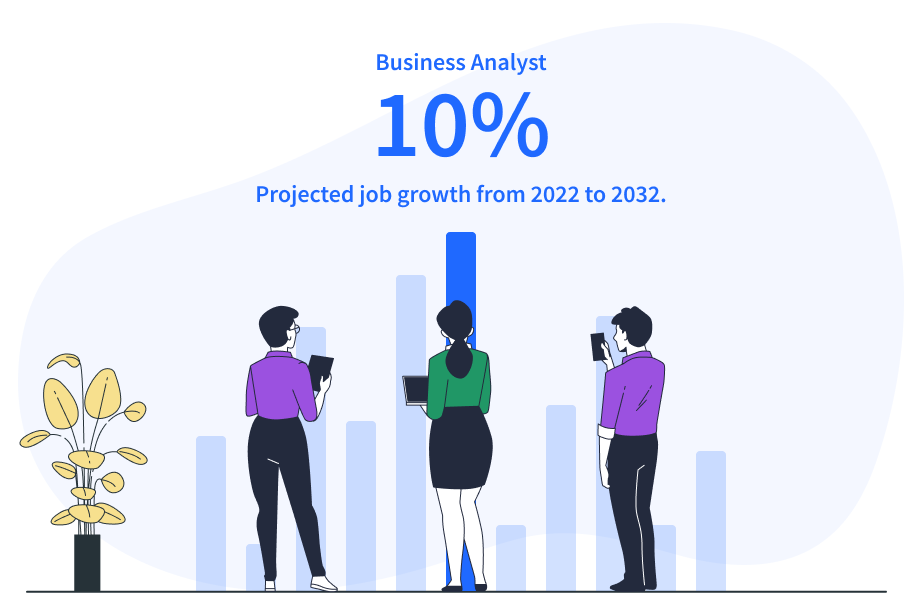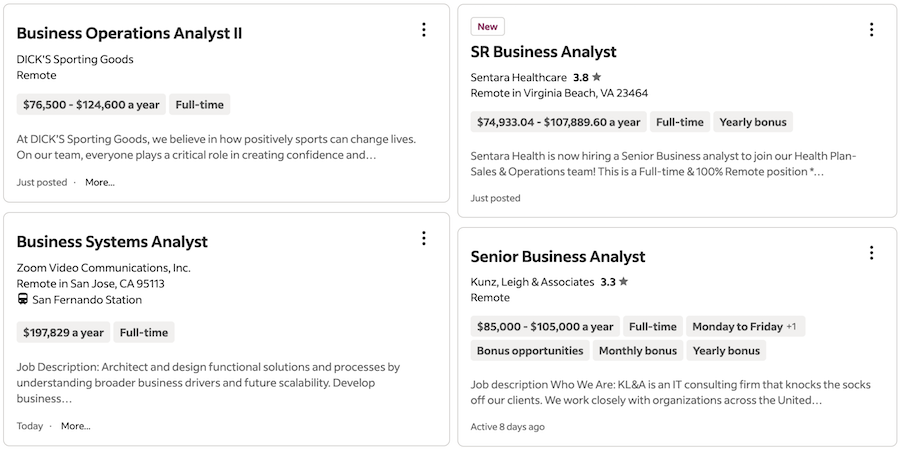
If you’re curious about a business analyst salary, you’re not alone. The demand for skilled business analysts (BA’s) is on the upswing. The U.S. Bureau of Labor Statistics projects 10% job growth for BAs from 2022 to 2032, which is faster than average. Emerging areas like technical business analysis are especially hot.
As companies rely more and more on data to drive decisions, business analysts will only become more vital. Building robust business analysis (BA) capabilities is a smart investment for any business that wants to compete and thrive in today’s digital age. Organizations are willing to pay a premium business analyst salary to professionals who can help them thrive in today’s data-centric workplace.
If you are looking for challenging and rewarding career in a field that is expanding, consider becoming a business analyst. In this article, we’ll provide insights into what business analysts do, the typical business analysis salary range, the skills required, and more.
What does a business analyst do?
Business analysts play a key role in aligning IT projects with a company’s strategic goals. Their days revolve around bridging the gap between technology and business needs.
A typical day for a business analyst involves:
- Meeting with stakeholders to gather requirements
- Analyzing needs and translating them into clear, feasible solutions
- Documenting requirements and refining user stories
To succeed and earn a high business analyst salary, BAs rely on a blend of technical skills like data analysis and soft skills like communication.
Most business analysts have at least a bachelor’s degree in a field like business administration or IT. Certifications like the Certified Business Analysis Professional (CBAP) or Certification of Capability in Business Analysis (CCBA) can showcase expertise, but do you really need a certification to get a job or earn a competitive business analysis salary? Not really. You can take a hands-on course such as the Dataquest’s Business Analyst with Power BI to build the key skills you need to impress employers.
Salary and career outlook for the business analyst

In the U.S.—at the time this post was written—the average business analyst salary was $104,964 per year. Business analysis salaries typically ranged from $95,523 to $115,974, depending on several factors (Salary.com). Please note that salary data may have changed slightly since this article was pulished.
The good news is that many business analytics jobs are in high demand. A few key factors that influence a business analyst’s salary include:
- Location – BAs in major cities tend to earn more
- Industry – Finance and tech often pay higher business analyst salaries
- Experience level and education
To advance your business analyst career and boost your business analysis salary potential, focus on gaining experience. Additional education or certifications can give you a leg up, but aren’t required. Specializing in an in-demand area like data analysis or IT business analysis is another smart move. Dataquest’s Business Analyst with Power BI path equips you with valuable skills to enhance your professional value and business analyst salary prospects.
Entry-level business analyst salary and job description
Common job titles:
- Junior Business Analyst
- Associate Business Analyst
- Business Analyst I
- Business Intelligence Analyst
- Operations Analyst
- IT Analyst
Launching your business analytics career begins with finding the right entry-level role. As an entry-level business analyst, you’ll serve as the critical link connecting data insights to business strategy. Intrigued? Let’s take a closer look at what this job involves.
In a typical day, you might gather requirements from stakeholders, wrangle data in Excel to uncover insights, or support the rollout of new initiatives. You’ll leverage tools like SQL and Tableau to analyze information and build compelling visualizations that drive decisions.
Business Analyst Salary: At the time this post was written, the typical salary range for an entry-level business analyst salary was between $73,000 and $127,000 per year according to Glassdoor. Please note that salary data may have changed slightly since this article was pulished. Earning potential is a key factor drawing many to this in-demand field.
Key responsibilities:
- Gathering and documenting business requirements
- Analyzing data to inform decisions and recommendations
- Supporting the implementation of projects and process improvements
- Collaborating with cross-functional teams to drive results
Most entry-level positions require a bachelor’s degree in business, IT, economics, or a related field. While prior experience isn’t always mandatory, internships or completing hands-on portfolio projects with data can give you a leg up on the competition. As you advance, certifications like the Entry Certificate in Business Analysis™ (ECBA) from IIBA can further showcase your growing expertise.
Must-have skills:
- Analytical thinking and problem-solving abilities
- Proficiency with data analysis tools like Excel and SQL
- Strong communication and relationship-building skills
- Ability to learn quickly and adapt to new challenges
Once you’ve gained these skills you’re ready to apply to business analyst jobs. To prepare for an entry-level business analyst interview, review common questions and practice your responses. Highlight relevant coursework, internships, or portfolio projects that demonstrate your analytical and problem-solving skills. Be ready to discuss a time you used data to solve a problem or make a recommendation.

An real Business Analyst job posting from LinkedIn.
Succeeding as an entry-level business analyst requires equal parts technical aptitude and business acumen. Your performance will hinge on your ability to accurately capture requirements, keep projects on track, and satisfy stakeholders. It’s a challenging role that demands continuous learning and adaptability.
However, for ambitious professionals, starting out as an entry-level business analyst offers significant potential for growth. With the right skills and experience, you can become an invaluable asset to your organization in a field that’s projected to see a 10% increase in demand by 2032. The strong business analyst salary outlook and ample opportunities for advancement make this an appealing career choice for analytically-minded job seekers. Ready to kickstart a rewarding career in analytics?
Mid-career business analyst salary and job description
Common job titles:
- Business Analyst II
- Business Consultant
- Functional Analyst
- Business Process Improvement Analyst
- Change Management Analyst
- Strategic Analyst
Are you a business analyst with 5-10 years of experience looking to take the next step in your career? Mid-career business analysts play an essential role in helping companies operate efficiently and drive growth. If you’re ready to put your skills to work on high-impact projects, this could be the perfect role for you.
In this position, you’ll analyze business data to uncover insights that guide strategic decisions. You’ll collaborate with stakeholders across the company to understand their needs and gain buy-in for initiatives. Strong analytical and problem-solving skills are a must, as is proficiency with tools like Python, R, Excel, SQL, Power BI, and Tableau.
Most mid-career business analysts have at least a bachelor’s degree in business or IT. An MBA or relevant certification can give you a competitive edge. As you grow, you’ll have the chance to specialize in an area or industry, take on leadership responsibilities, or pivot into a field like data science.
Business Analyst Salary: At the time this post was written, the typical salary range for a mid-career business analysts was between $98,000 and $170,000 annually, according to Glassdoor data. Please note that salary data may have changed slightly since this article was pulished. Advancing your business analyst career often comes with a significant bump in compensation.
Key responsibilities:
- Analyzing complex business data to identify opportunities for growth and efficiency
- Developing actionable insights and recommendations to inform strategic decisions
- Collaborating with stakeholders to understand needs and build support for initiatives
- Mentoring and guiding junior business analysts
Must-have skills:
- Strong analytical and problem-solving abilities
- Excellent communicator and relationship-builder
- Proficiency with analytical tools like Python, SQL, and Tableau
- Continuous learner committed to developing new skills
To ace a mid-career business analyst interview, prepare examples that showcase your experience leading projects and driving results. Highlight your proficiency with key tools and technologies like SQL, Python, and Tableau. Practice discussing how you’ve collaborated cross-functionally and managed stakeholder relationships.
Companies rely on skilled mid-career business analysts to help them navigate an increasingly data-focused business landscape. If you’re up for the challenge, this role offers plenty of room to grow your skills, make an impact, and advance your career. The competitive business analyst salary and diverse opportunities in this field make it an attractive option for experienced professionals looking to level up.

An example business analyst resume available from Canva
Senior business analyst salary and job description
Common job titles:
- Principal Business Analyst
- Lead Business Analyst
- Business Analysis Manager
- Business Strategy Analyst
- Organizational Development Analyst
- IT Program Manager
Senior business analyst play a key role in shaping business strategies and driving organizational efficiency. More than just number crunchers, they provide strategic leadership on high-impact projects and tackle an organization’s toughest challenges.
To succeed in this role, you need a powerful combination of technical know-how and people skills. Must-have technical skills include data analytics, business process modeling, and complex problem-solving. But that’s only half the equation.
Senior BAs are also master communicators, relationship-builders, and team leaders. It’s this blend of hard and soft skills that allows them to effectively manage major initiatives and guide their organizations to success.
Most senior business analyst have between 5-10 years of experience and a proven track record of delivering successful projects and driving strategic change. A bachelor’s degree in business, finance, IT or a related field is typically required. Many go on to pursue advanced degrees like MBAs or certifications like the Certified Business Analysis Professional (CBAP) to further boost their expertise and credibility.
Business Analyst Salary: At the time this post was written, at the senior level, business analysts could command salaries ranging from $132,000 to $201,000 per year, according to Glassdoor figures. Please note that salary data may have changed slightly since this article was pulished. That said, the substantial business analyst salary potential reflects the critical value these professionals bring to their organizations.
Key responsibilities:
- Leading and managing complex, high-visibility projects
- Analyzing data to identify risks, opportunities and recommendations
- Mapping and optimizing business processes
- Communicating insights to executives and cross-functional teams
- Driving change and building consensus across the organization
Must-have skills:
- Advanced data analysis and visualization
- Process mapping and optimization
- Exceptional communication and presentation skills
- Stakeholder management and influencing
- Strategic thinking and problem solving
One of the biggest challenges senior BAs face is navigating complex stakeholder relationships and getting buy-in for organizational changes. Overcoming these obstacles is key not only to their own career growth, but to the overall success of their companies. Top performers are always learning and growing through additional training, certifications, and mentoring to expand their influence.
When interviewing for a senior business analyst role, develop compelling stories around times you’ve shaped strategy and driven organizational change. Highlight your leadership skills and ability to influence executives and guide junior team members. Be prepared to discuss how you stay on top of industry trends and continuously expand your skill set.
In short, senior business analyst are the essential links that connect deep data insights to real-world business strategies. It’s a challenging job, but one that is absolutely critical for any organization that wants to thrive in today’s competitive landscape. The high business analyst salary range at this level reflects the immense value these strategic leaders deliver.

Conclusion
Becoming a top-notch business analyst and earning a high business analysis salary requires aligning your personal traits, professional skills, and interests. The most important qualities are strong analytical thinking, great communication, and a talent for solving complex problems.
Whether you’re just starting out or looking to advance, here are some key steps to take:
- Beginners: Start with foundational courses in SQL and Excel. Work on small data manipulation projects to gain practical experience.
- Intermediates: Level up your skills with advanced analytics tools like Power BI. Take on more complex projects involving data visualization and business intelligence.
- Advanced learners: Lead large-scale projects and consider earning certifications like CBAP to refine your expertise and credibility.
Dataquest offers comprehensive learning paths, like the Business Analyst with Power BI, that teach essential skills through hands-on practice. Engaging with communities like Dataquest’s forums can also enhance your learning journey.
No matter your career stage, real-world projects are vital. They solidify your knowledge, build your expertise, and help you make meaningful contributions at work. In fact, hands-on experience is one of the best ways to grow both personally and professionally.